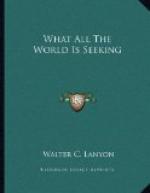Let us then to the answer, examine it closely, see if it will stand every test, if it is the true one, and if so, rejoice that we have found it, lay hold of it, build upon it, tell others of it. The last four words have already entered us at the open door. The idea has prevailed in the past, and this idea has dominated the world, that self is the great concern,—that if one would find success, greatness, happiness, he must give all attention to self, and to self alone. This has been the great mistake, this the fatal error, this the direct opposite of the right, the true as set forth in the great immutable law that—we find our own lives in losing them in the service of others, in longer form—the more of our lives we give to others, the fuller and the richer, the greater and the grander, the more beautiful and the more happy our own lives become. It is as that great and sweet soul who when with us lived at Concord said,—that generous giving or losing of your life which saves it.
This is an expression of one of the greatest truths, of one of the greatest principles of practical ethics the world has thus far seen. In a single word, it is service,—not self but the other self. We shall soon see, however, that our love, our service, our helpfulness to others, invariably comes back to us, intensified sometimes a hundred or a thousand or a thousand thousand fold, and this by a great, immutable law.
The Master Teacher, he who so many years ago in that far-away Eastern land, now in the hill country, now in the lake country, as the people gathered round him, taught them those great, high-born, and tender truths of human life and destiny, the Christ Jesus, said identically this when he said and so continually repeated,—“He that is greatest among you shall be your servant”; and his whole life was but an embodiment of this principle or truth, with the result that the greatest name in the world to-day is his,—the name of him who as his life-work, healed the sick; clothed the naked; bound up the broken-hearted; sustained the weak, the faltering; befriended and aided the poor, the needy; condemned the proud, the vain, the selfish; and through it all taught the people to love justice and mercy and service, to live in their higher, their diviner selves,—in brief, to live his life, the Christ-life, and who has helped in making it possible for this greatest principle of practical ethics the world has thus far seen to be enunciated, to be laid hold of, to be lived by to-day. “He that is greatest among you shall be your servant,” or, he who would be truly great and recognized as such must find it in the capacity of a servant.
And what, let us ask, is a servant? One who renders service. To himself? Never. To others? Alway. Freed of its associations and looked at in the light of its right and true meaning, than the word “servant” there is no greater in the language; and in this right use of the term, as we shall soon see, every life that has been really true, great, and happy has been that of a servant, and apart from this no such life ever has been or ever can be lived.




